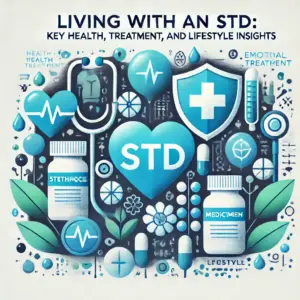A sexually transmitted disease (STD) diagnosis can be overwhelming, but it’s important to remember that millions of people live healthy, fulfilling lives with an STD. Whether it’s herpes, HPV, HIV, chlamydia, or another condition, modern medicine offers effective treatments and management strategies. Understanding how to take care of your health, protect others, and navigate relationships can help you live confidently while managing your diagnosis.

Understanding Your Diagnosis
After being diagnosed with an STD, the first step is education. Not all STDs have the same impact—some are curable, while others require long-term management.
- Bacterial STDs (chlamydia, gonorrhea, syphilis) are often curable with antibiotics.
- Viral STDs (herpes, HPV, HIV) are manageable but not always curable.
- Parasitic STDs (trichomoniasis) are usually curable with medication.
Your healthcare provider will explain the specifics of your condition, including treatment options and potential complications if left untreated. Understanding your condition reduces fear and helps you take control of your health.
Treatment and Long-Term Management
Treatment varies depending on the STD. Some require a single course of medication, while others involve ongoing care.
- Antibiotics: Used for bacterial infections like chlamydia, gonorrhea, and syphilis. Completing the full course is essential to prevent complications.
- Antiviral Medications: For viral infections such as herpes and HIV, antiviral drugs help reduce symptoms and transmission risks. HIV treatment, known as antiretroviral therapy (ART), allows people to live long, healthy lives.
- Topical or Procedural Treatments: HPV-related genital warts may be treated with prescription creams or in-office procedures like freezing or laser removal.
Regular check-ups ensure that treatment is working effectively. If your STD is lifelong, staying consistent with medication and monitoring is crucial for maintaining overall well-being.
Emotional and Mental Well-Being
An STD diagnosis can bring emotional challenges, including anxiety, shame, or fear of rejection. It’s important to address these feelings and seek support when needed.
- Educate Yourself: Understanding the condition reduces stigma and fear.
- Talk to Trusted People: Confiding in a supportive friend, therapist, or online support group can make a big difference.
- Practice Self-Care: Managing stress, eating well, and exercising can improve both mental and physical health.
STDs do not define a person’s worth or ability to have meaningful relationships. Many people with STDs find love, maintain healthy relationships, and build families.
Navigating Relationships and Disclosure
One of the most challenging aspects of living with an STD is disclosing it to partners. While it may feel uncomfortable, honesty and responsibility are essential.
- Know When to Disclose: For curable STDs, disclosure should happen before sexual activity. For lifelong STDs, such as herpes or HIV, it’s best to have the conversation early in a relationship.
- Use Clear, Honest Communication: You don’t need to apologize for your status. Instead, explain the facts, your management plan, and how you can still have a safe and fulfilling relationship.
- Discuss Protection Methods: Condoms, dental dams, and medications (such as PrEP for HIV prevention) reduce transmission risks.
While some partners may react with hesitation, others will be understanding and supportive. A positive reaction is often more common than expected.
Protecting Your Health and Your Partner’s
Taking precautions to prevent transmission is part of responsible STD management.
- Use Protection: Latex or polyurethane condoms and dental dams significantly reduce the risk of transmission.
- Stay on Treatment: If prescribed antiviral medications, taking them consistently lowers the risk of spreading infections.
- Regular Testing: Frequent STD screenings help catch new infections early and ensure that treatments are effective.
Even if you have an STD, you can still have a healthy and active sex life with the right precautions.
Fertility and Pregnancy Considerations
Some STDs can affect fertility or pregnancy outcomes if left untreated. However, with proper medical care, many people with STDs can have healthy pregnancies.
- HIV: With antiretroviral therapy, the risk of transmitting HIV to a baby can be reduced to almost zero.
- HPV: Certain strains can lead to complications, but regular screenings and medical guidance help manage risks.
- Chlamydia/Gonorrhea: These can cause infertility if untreated, but early treatment prevents complications.
Consulting a doctor early when planning a pregnancy ensures the safest possible outcome for both parent and child.
Living a Full, Healthy Life
Millions of people live with STDs, and most find that their condition does not prevent them from having happy, healthy lives. With proper treatment, open communication, and self-care, an STD diagnosis is manageable.
Taking charge of your health, finding support, and staying informed will help you move forward with confidence. Living with an STD does not define you—it’s simply a part of your health journey, and with the right mindset and resources, you can thrive.

